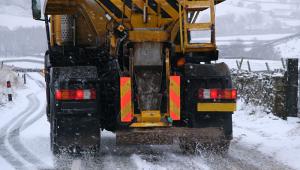By Mark Smulian
An expected second round of heavy snowfall was set to renew pressure on public sector managers this week after they faced criticism over road, transport and school closures.
Stocks of road salt were low in some areas, with transport problems hampering councils’ ability to replenish supplies. The snow on February 1 and 2 was the heaviest seen in southern England since 1991 and brought much of the transport system to a halt.
The Local Government Association defended councils against public complaints that they had run out of salt too early to treat the 95% of roads that they maintain. The Highways Agency and Transport for London handle the remainder.
LGA environment board chair Paul Bettison complained that other bodies disrupted by snow ‘appear to be using councils as a scapegoat for their own poor preparations for the weather’.
The association said salt stocks had ‘been massively depleted’ by the bad weather and remaining stockpiles ranged from two weeks’ to three days’ worth. Councils would collaborate to make the best use of supplies.
It said the volume of snow was so unusual that it would not have made economic sense for councils to spend ‘millions of pounds building up reserves that were lying idly by for years.
‘It’s not just the cost of the grit itself, but also the storage costs, maintaining the warehouses and security.’
But Peter Sherratt, general secretary of the Salt Association, said: ‘There is some sign that councils thought climate change meant they would never have to deal with severe winter maintenance again and spent the money on something else.
‘There is plenty of salt in the ground and it is coming up all the time. The problem is more one of transport since, if roads are blocked, salt lorries cannot get through.’
Matthew Lugg, chair of the County Surveyors Society engineering committee, said: ‘You cannot really compare the UK with countries which experience heavy snowfall on a much more regular basis.
‘If we were to provide for minor roads to be treated, we would be looking at a very significant increase in council tax to pay for it.’
Devon County Council staff battled to keep clear its 8,000 miles of roads – the largest local authority network. More than 1,000 tonnes of salt were spread on some 1,650 miles of priority routes once snow forecasts were received, and snowploughs were deployed in the county’s north and west.
Leader Brian Greenslade congratulated staff ‘who have been on duty day and night trying to keep main routes passable in temperatures that fell to –8ºC’. Schools across the south of England were closed in the early part of the week, attracting criticism from parents who were forced to take time off work to care for children.
Mick Brookes, general secretary of the National Association of Head Teachers, said: ‘Schools will make a realistic assessment of the circumstances and that risk assessment will look not just at whether children are safe but at whether enough staff can reach a school to supervise them.



















